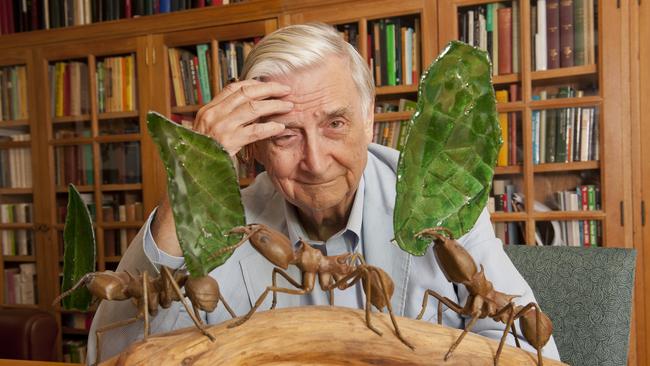Edward Wilson updated Charles Darwin and was similarly attacked
Edward Wilson saw how ants inherited traits such as self-sacrifice, and dared wonder if humans also passed on such influential genes.

Obituary
Edward Osborne Wilson Biologist. Born Birmingham, Alabama, June 10, 1929; died Burlington, Massachusetts, December 26, aged 92.
-
It doesn’t sound particularly extreme to suggest that human behaviour, like that of animals, is influenced by our heritage and that we might have less free will than we imagine. Edward Wilson described these evolutionary edicts as a genetic leash.
His 1975 book Sociobiology: The New Synthesis set out his thinking on the issue – and in doing so proved that the cancel culture that has gripped Western university campuses is not the recent phenomenon we might imagine.
The book analysed the inherited biological foundations of the behaviour of dozens of animals, including humans, and concluded that traits such as selflessness, aggression and greed can be inherited and are part of our nature and the result of natural selection.
Nature or nurture – it’s hardly a new debate.
Wilson may well have thought the reaction – aggressive and extreme – proved him right.
His Harvard colleague, evolutionary biologist Richard Lewontin, was first out of the blocks condemning Wilson’s theory as dangerous “genetic determinism” and dismissed the idea that behaviour or intelligence could be inherited.
Along with a dozen other academics he wrote a letter to The New York Times denouncing Wilson’s theory as racist and comparing it to Nazism.
They claimed Wilson was providing “a genetic justification of the status quo and of existing privileges for certain groups according to class, race or sex”.
In a modern version of book burning, at an address Wilson was giving to the American Association for the Advancement of Science, noisy placard-waving protesters (one banner featured a swastika) swarmed the stage and tipped a bucket of water him.
He described it as perhaps the first time “a scientist was physically attacked … simply for the expression of an idea”. He said social scientists and philosophers, “particularly those who were defending a Marxist ideology”, believed his book dangerous.
It was all a long way from his childhood in America’s south where he loved being outdoors and adventuring. Aged seven, he hooked a small pinfish but pulled too hard on his rod and it flew into his face, a spike on its spine puncturing his right eye and blinding it.
Wilson said that as a result he concentrated on things closer to the ground, particularly ants. As an obsessed, introverted youngster he found the first fire ant colony in the US. The dangerous imports have since spread from Florida to California.
He studied at the University of Alabama, completed a doctorate in biology at Harvard, then travelled the world to study ants – a discipline known as myrmecology – visiting Australia for research several times. He discovered many new ant species but, as he was keen to point out, science had probably observed and named about two million animal species while it was estimated there were more than eight million. “It is fair to call Earth a little-known planet,” he would say.
On a train trip in 1965 for more field work in Miami, he had an idea that updated Charles Darwin. Survival of the fittest had long been a tested and accepted theory, despite the contest between religion and science that Darwin knew it would spark, and why originally he had held back from publishing perhaps the world’s most influential book, On the Origin of Species by Means of Natural Selection.
Wilson thought about his ants. It was genetically rational that they would act to protect their blood relatives; passing on your DNA was the key to life. So why wouldn’t it be that social animals passed on traits that helped this co-operative survival, including self-sacrifice? Nepotism was hardwired.
To some degree – he argued about 10 per cent – inequality was in our genes. His controversial book was born, as was sociobiology.
He expanded his theory with the acclaimed 1978 book On Human Nature. It too sparked fierce debate, but by rounding out his thoughts that humans are not solely driven by cultural values we learn and absorb, he gained influential supporters, including the qualified backing of British philosopher Roger Scruton.
On Human Nature won Wilson a Pulitzer prize. A second came 13 years later when he co-authored the exhaustive reference work The Ants, a uniquely detailed examination of their history, anatomy and advanced social frameworks.
All up he won about 150 prizes for his research.
“It would be hard to understate Ed’s scientific achievements, but his impact extends to every facet of society,” said the chairman of the EO Wilson Biodiversity Foundation. “He was a true visionary with a unique ability to inspire and galvanise. He articulated, perhaps better than anyone, what it means to be human.”





To join the conversation, please log in. Don't have an account? Register
Join the conversation, you are commenting as Logout